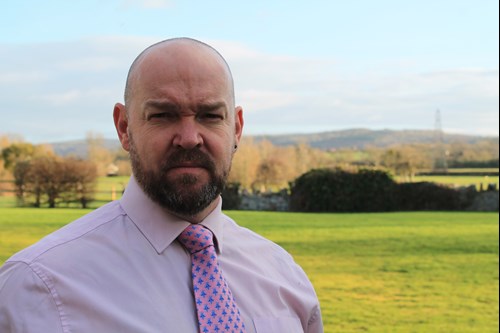Chairmans Blog: Innocent until proven guilty. Unless you are a Police Officer?
13 April 2023

Everyone has the basic entitlement to ‘a fair and public hearing within a reasonable time by an independent and impartial tribunal’.
Innocent until proven guilty. Unless you are a Police Officer?
Avon and Somerset Police Federation Chair Mark Loker discusses in his latest blog…
Let’s not forget;
• We are the only organisation that can and routinely use force to do our jobs.
• We routinely get called to resolve, or try to resolve disputes between parties which all too often results in neither party being ‘satisfied’
• We routinely deal with complaints from detained persons (arrested suspects) who seek to benefit from undermining an Officer through the complaints process.
Often, not always, but often there is a vexatious or malicious intent behind complaints made against our Officers, more than a deep-rooted concern for misapplication of our powers. That is why so many complaints never result in action being taken against Officers, but this is a muted narrative. In fact there is more focus on misleading statements from very senior Police Officers and Politicians than the truth in this.
Yes, Policing has had its fair share of terrible people doing terrible things and there will be more to come, but so have many other public service professions. MPs have had more than their fair share of scandal and they continue to do so. The NHS, Fire Service do too and they continue to do so, but I do not see draconian considerations or applications that their misconduct processes are not sufficient to satisfy as being the answer.
In 2014 the Police Misconduct proceedings were reviewed and later overhauled by the Government of that time behind a backdrop of wanting to provide greater transparency to the public, to prevent police hearings being ‘closed shops’, to prevent them being held behind closed doors and making them more in line with other judiciaries and tribunals. You can read the Chapman report here https://www.gov.uk/government/publications/the-police-disciplinary-system-in-england-and-wales
Chief Officers stating that they are frustrated that they cannot sack whom they want and Sir Mark Rowley seemingly stating that the Met are sacking Officers and that Lawyers are re-instating them is all rather misleading and simply not true.
In Police Misconduct cases the responsibility to investigate is on the Chief Constable, referred to as the Appropriate Authority. An objective and proportionate investigation should then be carried out and evidence, which the Home Offices’ own guidance stipulates must be more cogent depending on the severity of the allegation or the more serious the consequences for the individual which flow from a finding against him or her must be collated and presented.
This does not mean that the standard is higher. It means only that the inherent probability or improbability of the conduct occurring is itself a matter to be taken into account when weighing the probability and deciding whether on balance the conduct occurred or didn’t and then deciding on what sanction is appropriate.
The Appropriate Authority say whether there is a case to answer and then directs the matter to a hearing or misconduct meeting. If cases are then not deemed so serious as to justify dismissal that is not the Legally Qualified Chairs fault or failing, it is not even a failing of the forces Professional Standards Department, or the IOPC. It is of the fact that the matter is not that serious, that the evidence does not support the allegation.
We even have double jeopardy, something not allowed in criminal case. If a Police Officer is arrested and then found not guilty or not charged the forces can (and do) then run misconduct cases with the exact same evidence, 2 bites of the same cherry. Add into that our vetting review processes and there are technically 3 bites of the same cherry. In what other employment is that acceptable?
Misconduct hearings have legally qualified chair, there are then two others on the panel, an independent member of the public and a senior officer from the force, Superintendent or above. This Panel are then asked to determine whether the allegations have been proved on the facts, on the evidence and they then decide what is the most appropriate sanction to be imposed that satisfies the findings in those cases. Chief Constables have representatives on the Panel, the way this is all made to sound is that the Chiefs have no say in this, I can assure you they do and they do. To me this is a petulance from a very small number of cases where Chief Officers did not get their own way.
Let’s also not forget that if the Chief Constable objects to the findings they can bring judicial review proceedings and they do, as did our previous Chief Constable and in that particular case the Judicial Review agreed with the original findings that the Officer should NOT have been dismissed and the Panel’s decision was sound.
If we believe what these Chief Officers want us to believe in that misconduct hearings are just run by lawyers, that is not true. Even though the force always employs barristers at exorbitant cost to present the case on their behalf, despite having in house legal teams. Contrary to all this legal input, lawyers do not run the cases, the Forces do and each case is very heavily stacked in the favour of the Constabulary.
Our industry is one of the most heavily regulated and heavily scrutinised in the country but the regulations we have are more than sufficient and appropriate. If the Appropriate Authorities actually applied them correctly and Professional Standards Department actually investigated allegations properly and more promptly, we would have the right people being presented to panels who then should have only one decision to make.
I can assure anyone that none of us want people in our service, in our force that do not stand by the ethics, standards and oath that we all swear on and adhere to.
Policing deserves to have the very best in their ranks doing the most difficult job in the most difficult of times, but unless perspective is applied and support shown to our Cops then we will never recover from this and nothing will change. All this will do is instil fear and do nothing to promote the findings of the Chapman review where learning outcomes should be considered and preferred in the vast majority of cases.
If the application of the current rules and regulations we have in place are followed and adhered to, there is no risk of the worst not being held to account. The failings are not in the conduct regulations.
Sadly these misleading comments from very senior Chief Officers are reflections on their leadership and virtue signalling and changes in our regulations is not going to achieve what we all want. Culture change that is underpinned by process and regulatory change is only possible through effective leadership of Chief Officers and their senior leadership teams who need to support, reflect and accept where things have gone wrong, not whinge that their hands are tied.
The fear felt by our members at this time is unnecessary when it is less than 1% of our so-called colleagues that are affecting us all and the public we serve. I fear the mendacious approach being played out will only serve to set us back to closed shops and a failure for the rank and file to feel supported.
Chief Officers already have the power to dismiss ‘rogue’ Officers, what they are asking for is the power to dismiss anyone they choose without due process and without any comeback on them, that is the truth in this and that is not justice and that is not fair and impartial.

















